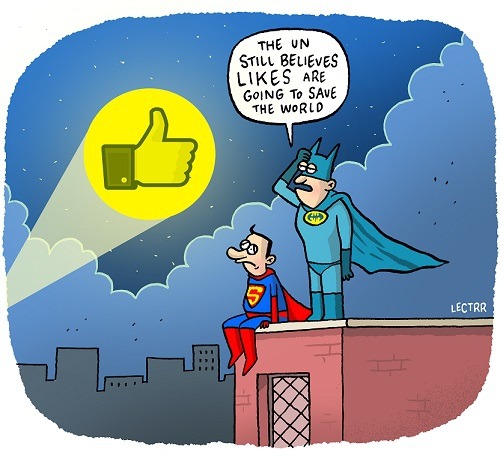Last month the UN launched its long-awaited new Global Goals plan. Within the course of 15 years, 17 global goals have to be achieved so that the world will be a better place. I am not a pessimist, and I have no special powers to predict the future. But I dare to say that the global goals for sustainable development-initiative risks to be a formidable failure. The reason for this is not that recent history tells us that noble ideas, positive initiatives and good intentions are inversely proportional to the actual goodwill and courage of world leaders to tackle the global issues that matter most.Neither is my skepticism a result of the fact that the UN does not have enough power to enforce certain goals upon its member states. The reason why the UN initiative seems doomed to fail resides in the way the UN promoted it. Its campaign reveals that the UN does not live according to what it preaches, and seems more concerned about the commercialization instead of the realization of its global goals.
Noble goals
It cannot be denied that the goals set by the UN to end poverty and to add a few years to the expiration date of our planet are noble. All goals – clean water, proper education for all, protecting and revitalizing life below water and life on land, peace and justice, etc. – have one overarching goal: sustainable development. That is of the highest importance, since we know that mankind has self-destructive inclinations and that we are suffocating our planet by the way we live. Yet I cannot help but frown when I look at how the UN promotes its goals.
Philanthropy and celebrity
To increase public awareness about the global goals the UN asked a wide range of celebrities to become ambassadors of the global goals. These ambassadors were then flown to New York to speak at the United Nations. One can already wonder to which extent such a large-scale initiative is conducive to sustainable development. The environmental damage caused by the aviation industry and kerosene emissions is well-known.
But that’s not what troubles me the most, and neither do I want to deny that celebrities can play an important social and political role, and bear specific responsibilities in this regard. People like Bill Gates, Angelina Jolie and Bono are among the most privileged in the entire world. But they have made use of their privileged position to actually help those who are underprivileged. As such they are credible and can even be called moral authorities in matters concerning the development of third world countries, the combat against poverty and social injustice and the defense of human rights. They are the proof that celebrity status and philanthropy can be a good match.
The UN and the blogosphere
However, the UN has not been particularly thoughtful in its selection of its global goals ambassadors. That is why they are immediately off to a bad start. To give but one example, one of the global goals ambassadors is Tanya Burr. Burr is a British fashion and beauty blogger. On YouTube she praises cosmetics and clothes and via social media she lets people take a look at her personal life and what she does. Burr has more than two million followers on YouTube and her videos have been watched more than a hundred million times.
For people who are not familiar with the so-called blogosphere this might seem a peculiar thing, but the blogosphere is big business and has become a crucial part of the advertising industry. The popularity and fame of some YouTubers equal those of many Hollywood stars. By saying what kind of lip gloss you like, what kind of eye shadow really is a bargain, and what kind of dress is really flattering for people who have love handles, you can actually become a superstar and a millionaire.
YouTubers are used as living billboards and the most popular among them can easily earn many thousands of dollars per month, merely by advertising products, by consuming exuberantly, by traveling around the world from one launch party and advertising event to another, and by displaying how they live on YouTube, Instagram, Snapchat and Twitter.
Authenticity
To give the reader just an idea of how popular beauty bloggers are and how they impact the lives of millions of people, think of the following. A few months ago one of the most popular beauty bloggers, Zoella, published her first novel: Girl Online. The book was an instant bestseller. It sold almost hundred thousand copies in its first week on the market and scored the highest first-week sales for a debut author ever. Thousands of teenage girls rushed to the bookshops. As it later turned out, Zoella had not written the book, a ghost writer had. The beauty blogger was just an advertising tool, and it must be said: what an effective one! If authenticity is a noble thing and even a moral value, serious objections can be raised against such practices and the phony authenticity that prevails in many parts of the blogosphere.
Fragile teenagers
I do not want to claim that being a YouTuber can’t be an honorable profession, and that honest and talented people try to make the best of the opportunities the new media have to offer. Knowing how to put on your make-up properly and having good taste is surely a talent. But the entire beauty and cosmetics industry and the world of beauty bloggers do raise some moral questions. The most important target audience for people like Tanya Burr are teenagers. These teenagers are constantly confronted with the same message: buy, buy, buy! Spend more money! Moreover, the message to these teenagers is always, if not explicit than at least implicit, that they need all those cosmetics and fancy clothes to be more beautiful and happy. How this can positively impact the beauty ideal and self-image of often fragile teenagers is highly questionable.
Overconsumption
Ironically, responsible consumption and production is the 12th global goal. The UN explicitly recognizes that overconsumption is too heavy a burden on the shoulders of our small planet. Beauty bloggers spend hundreds and even thousands of dollars per month on products they cannot possibly use (up) and they promote over consumption. Nobody needs twenty types of mascara, hundred kinds of lip gloss or five new Ray-Ban sunglasses a year.
Moreover, it can be observed that Tanya Burr has started her own brand of cosmetics. But to my knowledge, her brand does not have the cruelty free label or the label that its ingredients are biodegradable or that it is made in a sustainable way. And on her channel and on social media, Burr promotes products that are made in China and tested on animals (which is prohibited in several European countries). How to reconcile this with animal rights and global goals number 14 and 15 – the protection of life below water and on land?
Lead by example
By opting for such ambassadors the UN undermines its own goals. The UN seemed more concerned about the fame of its goals, than about their workability and credibility. The world will not become a better place thanks to shallow pleas. The world needs people who lead by example. The young Dutch student Boyan Slat for example, who developed a plan to clean out the oceans. Or Steven Vroman, known as low impact man, whose campaigns to protect the environment are credible precisely because Vroman consistently tries to reduce his own ecological footprint.
Only such people can be credible defenders of a brighter future: people whose moral authority does not depend on the amount of subscribers they have or how many likes on YouTube or Facebook, but on how they live. The only option to regain credibility for the global goals campaign is to ask its ambassadors to change their own ways of life. It is easy to say the world needs to change, without acknowledging we need to change. A better world begins in each of us: not in what we say, but in what we do.
Dislike
We live in an era in which our global and moral goals have to be profitable. They need to fit within a commercial and economic framework to be effective. They need to get attention, likes on Facebook; they need to become hashtags on Twitter. The paradox is that it is exactly this commercial framework and the narrow market economy mentality of profit and popularity that obstructs real sustainability and that suffocates our planet. The UN shot itself in the foot. It reduced its global goals to the same category as a Mac lipstick or L’Oreal shampoo; to the category of products that have to be advertised and that need to sell, and that aren’t made or promoted in a very sustainable fashion. That is worth a firm dislike and many thumbs down.


